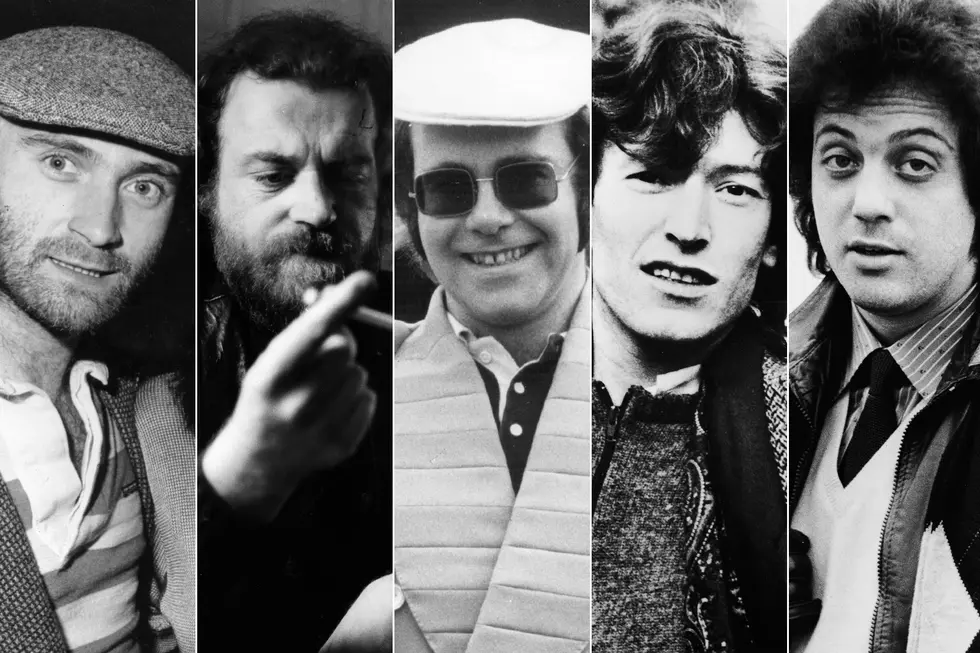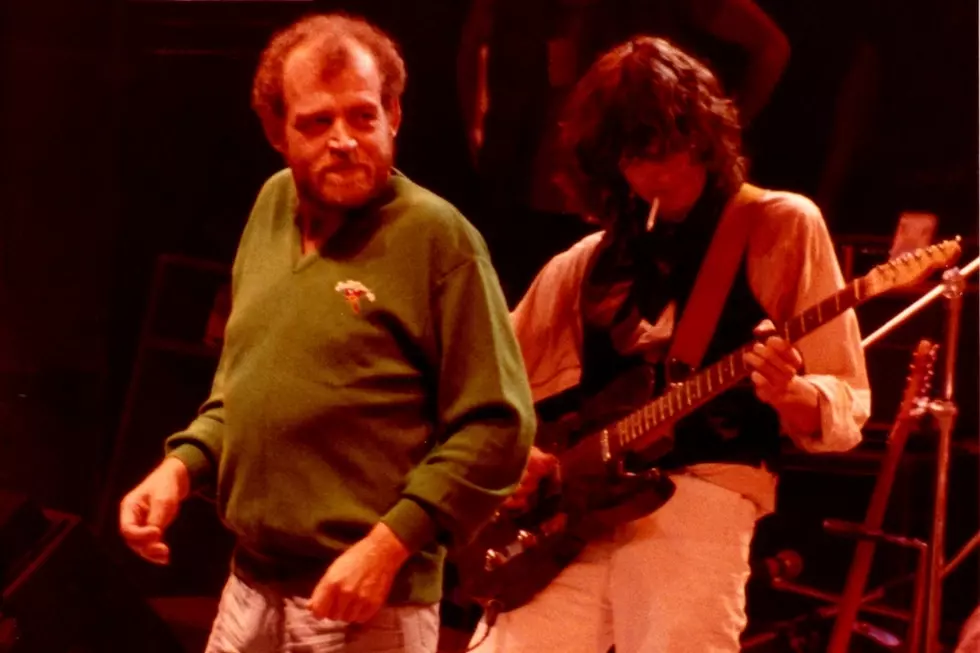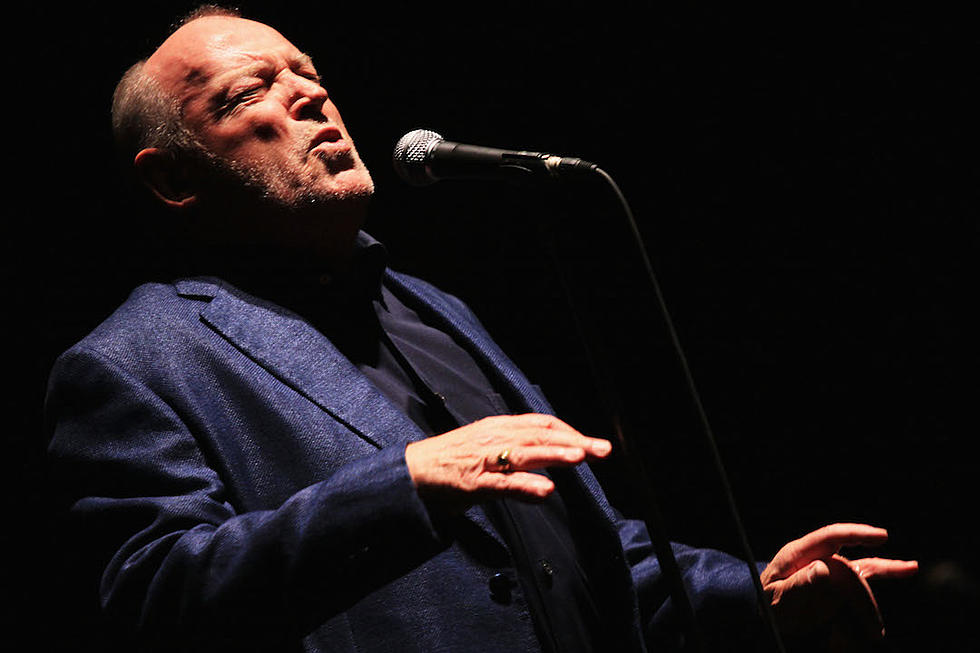
Up Where They Belong?: How Rockers Transitioned to Adult Contemporary
The phrase “Adult Contemporary” might as well be an epithet to rock fans. It’s a genre that’s wielded as a weapon by listeners against artists who’ve gone soft or slick or sappy. This reflex has been conditioned for years by “lite rock” radio stations, earnest love songs and the seemingly endless playlist of Celine Dion ballads that await any grocery store shopper.
The Adult Contemporary tag doesn’t just make rock fans bristle, it can annoy the musicians who’ve scored an AC hit – or, in Billy Joel’s case, 36 of them. Joel expressed his frustration with the connotations of the genre in a 1980 interview, just as his “Don’t Ask Me Why” was topping Billboard’s Adult Contemporary chart.
“A lot of people … think that my ballads are something to be played only on Adult Contemporary Dentist’s-Office Easy-Listening stations. I’m just trying to be accepted for doing a diversity of things,” Joel told Rolling Stone. “But when the Beatles did ‘Yesterday,’ did that mean that they became an Adult Contemporary group suitable only for dentists’ offices? No, that didn’t stop them from doing any of the trashy rock ’n’ roll stuff they did.
"Same thing with the Stones," Joel added. "They did ‘Angie’ and ‘Ruby Tuesday,’ but it didn’t mean they weren’t the Stones anymore or had deserted their audience.”
But when the Beatles and the Rolling Stones were releasing those classic ballads, Adult Contemporary didn’t exist. The Billboard chart’s predecessor was called Easy Listening, a phrase that’s equally unpleasant for the rock ’n’ roll-oriented. And there’s a good reason for that. The trade magazine created the Easy Listening chart in 1961 because some radio stations wanted to keep playing a selection of current pop songs that had little, if any, relationship to rock. In its first couple years, Easy Listening featured the likes of Connie Francis, Jimmy Dean, Bobby Vinton and Nat King Cole, as well as (via slow ballads) Elvis Presley and Ray Charles.
Billboard tinkered with the label a couple of times in the early ’60s, switching Easy Listening to the more insulting Middle-Road Singles then the hard-to-define Pop-Standard Singles, before reverting to Easy Listening in 1965. Even though British Invasion groups such as the Beatles were releasing gentle ballads at the time, the closest the Fab Four would get to the Easy Listening chart during Beatlemania was George Martin’s orchestral version of “This Boy” from the soundtrack for A Hard Day’s Night. A sharp divide was enforced: Beatles and Stones on one side, Frank Sinatra and Dean Martin on the other.
Listen to the Beatles Perform 'This Boy'
But by the end of the ’60s, attitudes began to shift. Teenage Beatles fans had grown up and older listeners devoted to the classic crooners had begun to appreciate the merits of the younger generation’s songwriters. The George Harrison-penned ballad “Something” made the Easy Listening charts in 1969 and Ol’ Blue Eyes was covering it soon after. That sort of crossover could be traced back to the Beatles’ “Yesterday,” which had gradually become a contemporary standard after its 1965 release.
“‘Yesterday’ was a personal victory of mine,” Paul McCartney, who wrote the song, told Fresh Air. “So there was this sort of group that didn’t like us that thought we weren’t very good. So when ‘Yesterday’ came out, I think a lot of them had to change their tune. And it eventually got recorded by way too many of them.”
“Let it Be” and “The Long and Winding Road” became worthy of the Easy Listening charts just as the early ’70s singer-songwriter movement became a pop music phenomenon. Although these artists – such as Don McLean, James Taylor and Jim Croce – played softer, acoustic-based material, they also had a foot in the rock world. After all, McLean’s 1972 Easy Listening chart-topper “American Pie” was a paean to the history of rock ’n’ roll up to that point.
The turn of the ’70s saw the emergence of other artists, many of them who were in the realm of the typical singer-songwriter, who would become huge stars of the Easy Listening chart. Neil Diamond would land at least one single on the chart every year from 1969 through 1987 (when Billboard would no longer call it Easy Listening; more on that in a moment). Then there were Chicago, the Eagles and Fleetwood Mac – bands that got respect from rock audiences while still earning hits among Easy Listeners. And don’t forget the king of the chart, Elton John.
Listen to Elton John Perform 'Daniel'
Elton’s music would resist the Easy Listening sticker, if only because his recordings defied easy categorization. In the ’70s, John combined classical touches with Broadway bombast and delivered pop songs with a country and western lilt. He scored hits on the Easy Listening chart, but also R&B, rock and pop charts. Many of his singles were smooth and pretty, but some of his music proved to be anything but an “easy” listen.
Apparently sensing that the derided Easy Listening phrase had outlived its application to the music it referenced, Billboard renamed the chart one more time. In 1979, Easy Listening became Adult Contemporary – a moniker that became just as likely to induce a shudder among rock fans, but would endure for more than three decades.
Some of the stars who had become Easy Listening staples would endure right with it, including John, Diamond and Joel. Even all four Beatles, as solo artists, would appear on the chart. Ringo Starr had already scored a bunch of Easy Listening entries when John Lennon’s posthumous ballads turned into Adult Contemporary hits in the early ’80s. McCartney’s collaborations with Michael Jackson and Stevie Wonder became AC chart-toppers, as did a pair of Harrison’s shiny pop ditties (“All Those Years Ago,” “Got My Mind Set on You”).
Listen to Michael Jackson and Paul McCartney's 'The Girl Is Mine'
They would be joined by a man whose Beatles covers had propelled him to stardom in the late ’60s: Joe Cocker. The English singer had landed an Easy Listening hit in the ’70s with “You are So Beautiful” (written by Beatles associate Billy Preston), although the soulful number wasn’t out of character in relation to Cocker’s other R&B-tinged hits. The circumstances would be different with “Up Where We Belong,” a power ballad duet with Jennifer Warnes that was part of the soundtrack to director Taylor Hackford’s 1982 film An Officer and a Gentleman. Cocker wasn’t sure he even wanted a part of the song in the first place.
“I remember when we did ‘Up Where We Belong’ – like the whole theme of the movie was designed around that song,” Cocker said in 2012. “And Stewart Levine, the producer [of the song], said, ‘Joe, I can hear you sing it.’ And I hated the demo they sent me. You know, I said, ‘I just don’t want to do this – it’s not my thing, you know?’ And Stewart persisted. He said, ‘I know we could have a massive record if you did this.’ And so I relented, and then in the end I kind of could hear as I was singing it that he was turning [it] into something special, you know?”
“Up Where We Belong” became a massive hit, going into heavy rotation on lite rock radio (on which it would continue to be played for years to come), hitting No. 3 on the Adult Contemporary charts and even No. 1 on Billboard’s overall list on Nov. 6, 1982. It won an Oscar and resulted in a reinvigorated career for Cocker, who landed more AC hits as the decade continued.
Listen to Joe Cocker and Jennifer Warnes Perform 'Up Where We Belong
Cocker wasn’t the only rocker to score an Adult Contemporary smash with a big ballad from a movie directed by Hackford. Phil Collins would land on the chart with both “Against All Odds” (from the 1984 movie of the same name) and “Separate Lives” (a duet with Marilyn Martin from the 1985 movie White Nights). These would just be a couple of the sometimes Genesis drummer’s incredible run as an Adult Contemporary darling, resulting in a total of 33 charted singles – plus 13 more if you count his work with Genesis.
In the ’70s, that band had begun as a progressive rock outfit with Peter Gabriel out front, before the singer went solo and the group’s drummer, Collins, took the mic. Collins steadily steered Genesis in a pop direction, before striking out on his own and becoming an unlikely pop phenomenon. In the ’80s, he built a middle-aged, female-leaning audience (the target demographic of Adult Contemporary) that earned blockbuster albums and singles for him and Genesis. Collins has since talked about his AC superstar streak with befuddlement and angst.
“I was always there,” Collins told The Guardian in 2016. “I was always in your face. People were always talking about me, usually not in a nice way. There was definitely too much of me.”
He has spoken with regret about his No. 1 Adult Contemporary hit remake of Wayne Fontana and the Mindbenders’ “Groovy Kind of Love,” one of a few ’60s and ’70s era pop and rock songs that were retooled for the lite rock airwaves. Perhaps the idea was that the teenagers who had grown up on rock ’n’ roll in the ’60s and ’70s had mellowed a bit, and the music could too. One of the more brazen attempts at ’80s AC nostalgia was Will to Power’s synthesizer-laden “Baby, I Love Your Way/Free Bird Medley,” which mashed together Peter Frampton’s pop (and Easy Listening) hit with Lynyrd Skynyrd’s epic rocker (which would have never made the Easy Listening/Adult Contemporary charts with those screaming electric guitars).
Listen to Phil Collins' 'Against All Odds'
If it was unexpected that a Skynyrd song could be an Adult Contemporary hit, it was shocking that two members of Led Zeppelin topped the AC charts. Robert Plant and Jimmy Page, collaborating in the Honeydrippers, hit No. 1 with their cover of “Sea of Love” in 1984. As the former Zeppelin singer, Plant was embarrassed because he thought it would change his image from a golden god of hard rock to a crooner.
But Page and Plant weren’t alone in finding that their slower, softer material was at home alongside tunes by Lionel Richie, Sade and Whitney Houston. After Bruce Springsteen became a full-blown pop star with Born in the U.S.A., the hushed ballad “My Hometown” topped the Adult Contemporary chart (followed by some of his other subdued singles). Bob Seger made repeat appearances, as did the Moody Blues, while .38 Special had an AC smash with “Second Chance” in 1989.
Heart and Starship (the latter of which had its DNA in Jefferson Airplane) became Adult Contemporary darlings, aided in part by Elton John lyricist Bernie Taupin, who co-wrote “These Dreams” and “We Built This City.” Meanwhile, Steve Winwood – formerly of soul-drenched rock band the Spencer Davis Group and progressive rockers Traffic – became an AC sensation by embracing the finer things in recording, namely prominent melodies, readily apparent hooks and glossy production. After years of avoiding the spotlight, Winwood defended his new status by telling Rolling Stone that he was embracing his role as an entertainer.
“I made a conscious effort three years ago to start working with musicians and producers and engineers,” he said in 1988. “It’s got to be a balance, and it's hard to get the balance right every time. I spent a lot of years doing stuff where people said, ‘That’s fantastic,’ but nobody bought it. That also is a bad situation, because what are you achieving? You do want to be heard – unless you’re trying to create some elitist thing.”
Listen to Steve Winwood's 'Back in the High Life Again'
Once the Adult Contemporary chart and radio format opened up to maturing rock stars, there was no stopping the onslaught of ballads and mid-tempo (lite) rockers. MTV Unplugged brought Eric Clapton to the AC party and helped cement Rod Stewart’s role as a frequent contributor. A departure from the Police made Sting a long-lasting presence, alongside Don Henley and Bryan Adams. Michael Bolton, who had started as a hard rocker who opened for Ozzy Osbourne and attempted to front Black Sabbath, changed his approach to become what Robert Plant didn’t want to become: an Adult Contemporary crooner.
An Easy Listening or Adult Contemporary hit once seemed anathema (or at least inconvenient) to rock artists. But in the 21st Century, with the way that the record industry and radio formats have changed, some long-running rockers have been pinning their best hopes on scoring a position on Billboard’s AC charts. In 2010, Heart’s Nancy Wilson expressed her appreciation that lite-rock stations were playing Heart’s new single. “It’s getting a lot of radio airplay at adult contemporary. You gotta feel good about that,” she told Entertainment Weekly.
Listen to Eric Clapton's Live Version of 'Layla'
Seger talked about coming to terms that AC was the only place left on the charts or airwaves for his singles. “Playlists are so tight that it’s a hard thing for people like [Bob] Dylan, [Tom] Petty and the Eagles and even Springsteen to get play on anything new we release,” Seger said in 2006. “We are considered classic so when we release something new, formatted stations won’t play us, or we’re relegated to Adult Contemporary. … So you wait patiently and hope that something busts out.”
That kind of frustration runs deep among classic rockers, who don’t have much of a chance at getting to No. 1 amid the presence of younger pop stars such as Ed Sheeran, Adele, John Legend and Justin Timberlake. Recent editions of the chart also turn over slowly – in a calendar year, the top spot might be held by 10 different songs, where in the ’80s, more than double that amount hit No. 1.
Back then, singles by Elton John often appeared atop the chart. After all, the rock legend has landed a record 71 entries on the Easy Listening/Adult Contemporary charts in his career (Barbra Streisand is No. 2 with 64). Yet, even the titan of the format has spoken ill of Adult Contemporary.
“These days, you look at the Adult Contemporary charts and it’s like, ‘Are you fucking kidding me?” John told Rolling Stone in 2014. “‘This record came out two-and-a-half years ago!’”
A few decades ago, Billy Joel wasn’t sure he wanted any part of Adult Contemporary. Now, his friend John is wishing they’d make more room for the veterans.
Top 100 Classic Rock Artists
More From Ultimate Classic Rock









